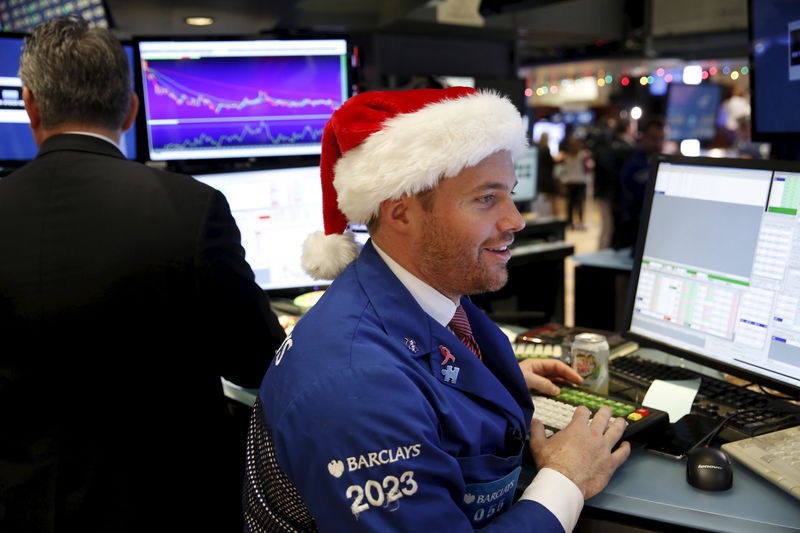Investing.com - With little in the way of market-moving data, news headlines are more likely to drive risk sentiment in the week ahead.
Trading volumes are expected to remain light during the week due to the Christmas holiday as many traders already closed books before the end of the year.
Market focus will stay attuned to developments out of Washington DC after the failure by the U.S. Congress and President Donald Trump to agree to a spending bill by midnight Friday resulted in a partial U.S. government shutdown.
The latest dysfunction in Washington does not bode well for bipartisan cooperation next year, when Democrats will have a stronger hand as they take control of the House of Representatives.
Meanwhile, reports that President Trump suggested firing Federal Reserve Chair Jerome Powell, a move that could roil already volatile financial markets, will also be in focus.
Last week, the U.S. central bank lifted rates for the fourth time this year, drawing the ire of Trump, who has repeatedly attacked the Fed's tightening as damaging to the economy.
Elsewhere, on the data front, the U.S. will see a relatively quiet week in terms of economic releases, with reports on consumer confidence and the housing sector expected to draw the most attention.
Investors will also be keeping abreast of the ongoing trade spat between the U.S. and China to see if any more news materializes.
There is also Brexit to keep an eye on.
Ahead of the coming week, Investing.com has compiled a list of these and other significant events likely to affect the markets.
1. Christmas Vacation
U.S. stock and bond markets will see an abbreviated session on Monday, with equity markets ending at 1:00PM ET (18:00 GMT), while bond markets are set for a 2PM ET (19:00 GMT) close.
Both markets will be closed on Tuesday in observation of Christmas Day.
Stocks plunged again on Friday, sending the Dow Jones Industrial Average to its worst week since the financial crisis in 2008, down nearly 7%. The Nasdaq Composite Index closed in a bear market and the S&P 500 was on the brink of one itself, down nearly 18% from its record earlier this year.
2. U.S. Government Shutdown
A partial U.S. government shutdown was almost certain to drag through the Christmas holiday after the Senate adjourned on Saturday without breaking an impasse over President Trump's demand for more funds for a border wall.
Building a wall along the border with Mexico to keep migrants from entering the country illegally was a central plank of Trump's presidential campaign, but Democrats are vehemently opposed and have rejected his funding request of $5 billion.
Trump took to Twitter on Saturday morning, threatening a "long stay" if he does not get the "Border Security" he's demanding.
With no deal in sight on a bill to fund the government, Senate Republican leader Mitch McConnell sent senators home until Thursday.
While he said he would call them back if a deal was struck, the decision all but guaranteed a partial shutdown would stretch at least until then.
The shutdown caps a perilous week for the president, with Defense Secretary James Mattis resigning in protest at Trump's sudden decision to pull U.S. troops out of Syria.
3. Trump vs. the Fed
President Trump has privately discussed the possibility of firing Federal Reserve Chairman Jerome Powell, a move that could roil already volatile financial markets, two sources familiar with situation said on Saturday.
The sources added that they do not expect Trump to dismiss the U.S. central bank chief, despite the president's public and private objections to the Fed's interest rate-hiking campaign and his repeated criticisms of Powell, whom he appointed.
U.S. Treasury Secretary Steven Mnuchin, however, tweeted late Saturday that Trump had told him that never suggested dismissing the Fed chief.
An attempt to remove the Fed chairman would be unprecedented and seen as an attack on the U.S. central bank's independence, which is meant to insulate it from political considerations.
Trump has frequently attacked Powell, who was sworn in as Fed chairman early last February, and the Fed for raising borrowing costs this year, especially as U.S. stocks have tumbled and yields on U.S. government debt have begun to signal a possible recession ahead.
4. CB Consumer Confidence
On the data front, the Conference Board will release its December update on U.S. consumer confidence at 10:00AM ET (15:00 GMT) Thursday.
The consensus forecast is for a reading of 133.7, down from 135.7 in October.
If confirmed it would be the weakest reading in four months.
5. U.S. Housing Data
The Commerce Department will publish a report on new home sales for November at 8:30AM ET (13:30 GMT) on Thursday.
It is expected to show that sales of new U.S. single-family homes rose 2.5% to 569,000 last month, after tumbling to a more than 2-1/2-year low of 544,000 in October.
On Friday, the National Association of Realtors will release data on November pending home sales at 10:00AM ET (15:00 GMT), amid expectations for a gain of 1.1%.
Recent data has painted a worrying picture of the U.S. housing market, which is taking a hit from rising mortgage rates.
-- Reuters contributed to this report
